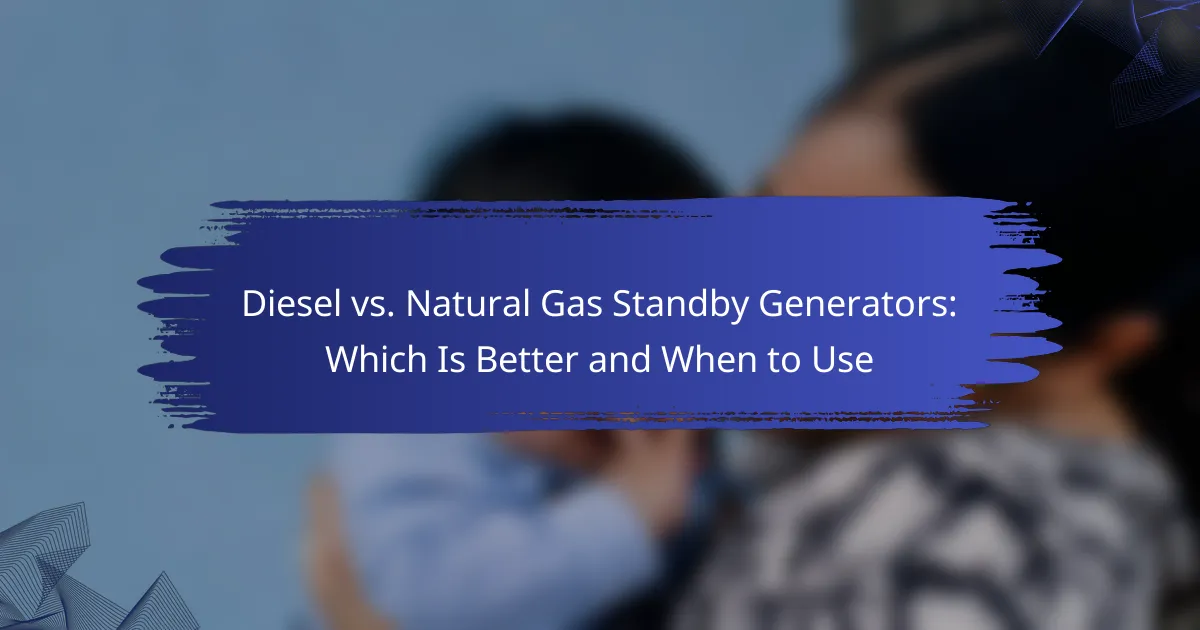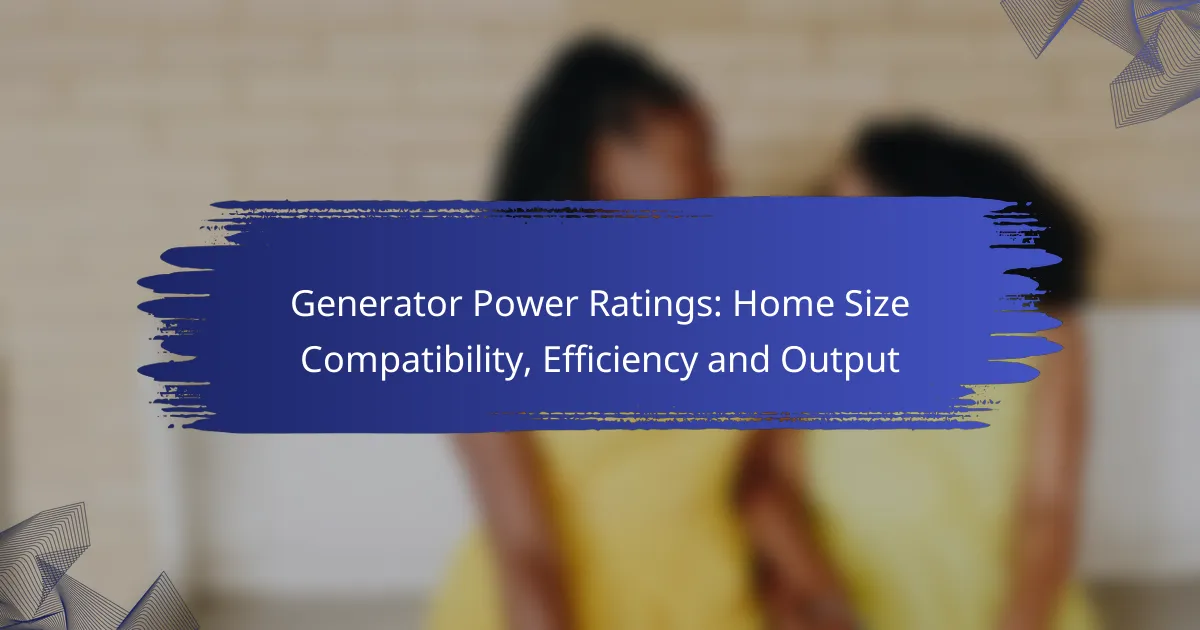Selecting the right standby generator involves careful consideration of various factors such as power requirements, fuel type, noise levels, installation space, and budget. These elements are essential for ensuring that the generator operates efficiently and meets your specific needs. Standby generators not only provide reliable power during outages but also enhance convenience and safety, making them a worthwhile investment for both homes and businesses.

What factors should you consider when selecting a standby generator?
When selecting a standby generator, consider power requirements, fuel type options, noise levels, installation space, and budget constraints. Each of these factors plays a crucial role in ensuring that the generator meets your specific needs and operates efficiently.
Power requirements
Determining your power requirements is essential for selecting a suitable standby generator. Calculate the total wattage needed to run essential appliances and systems during an outage, including HVAC, refrigeration, and lighting. Generally, a generator should provide at least 20-30% more power than your calculated needs to accommodate startup surges.
For example, if your essential devices require 5,000 watts, consider a generator rated for at least 6,000-7,000 watts. This buffer ensures reliable performance and prevents overloading.
Fuel type options
Standby generators can run on various fuel types, including gasoline, propane, and natural gas. Each fuel type has its advantages and disadvantages, affecting your choice based on availability, cost, and storage considerations. For instance, natural gas is often more convenient for permanent installations, while propane can be stored indefinitely.
Consider local fuel prices and availability when making your choice. In some regions, propane may be more economical, while in others, natural gas could be the preferred option due to lower ongoing costs.
Noise levels
Noise levels are an important consideration, especially if you live in a residential area. Standby generators can produce significant sound during operation, typically ranging from 60 to 80 decibels. Look for models with noise-reduction features or enclosures to minimize disturbance to your household and neighbors.
Check local regulations regarding noise ordinances, as some areas may have restrictions on generator operation times or sound levels. Choosing a quieter model can help you comply with these regulations.
Installation space
Assessing your available installation space is crucial for selecting a standby generator. Generators require adequate clearance for ventilation and maintenance, typically needing at least 3-5 feet of space on all sides. Ensure that the chosen location is accessible for fuel delivery and servicing.
Consider the generator’s dimensions and weight, as larger models may require a concrete pad or additional structural support. Planning for proper installation can prevent future complications and ensure safety.
Budget constraints
Your budget is a significant factor in selecting a standby generator. Prices can vary widely based on power output, fuel type, and features, typically ranging from a few hundred to several thousand dollars. Factor in not only the initial purchase price but also installation costs and ongoing fuel expenses.
Look for models that offer the best value for your needs. Investing in a reliable generator may save you money in the long run by preventing losses during power outages. Consider financing options or rebates that may be available in your area to help manage costs.

What are the benefits of standby generators in urban areas?
Standby generators provide reliable power during outages, ensuring that homes and businesses in urban areas remain functional. They offer convenience, safety, and can enhance property values, making them a valuable investment for city dwellers.
Automatic power restoration
Standby generators automatically detect power outages and switch on within seconds, restoring electricity without manual intervention. This feature is crucial in urban areas where power interruptions can disrupt daily life and business operations.
Most modern standby generators have an automatic transfer switch that seamlessly connects to the home’s electrical system. This ensures that essential appliances, such as refrigerators and heating systems, continue to operate during an outage.
Enhanced property value
Installing a standby generator can significantly increase a property’s market value. In urban settings, where power reliability is a concern, potential buyers often view generators as a desirable feature.
Homes equipped with standby generators may attract higher offers, as they provide peace of mind and convenience. This investment can yield returns that exceed the initial costs, particularly in areas prone to frequent outages.
Improved safety during outages
Standby generators enhance safety by ensuring that critical systems remain operational during power failures. This includes lighting, security systems, and medical equipment, which are vital for maintaining safety in urban environments.
By preventing power loss, standby generators reduce the risk of accidents and emergencies that can arise during outages, such as food spoilage or loss of heating in cold weather. This reliability is especially important in densely populated areas where the impact of outages can be more pronounced.

How do different fuel types impact generator performance?
Different fuel types significantly influence generator performance, including efficiency, availability, and maintenance needs. Understanding these factors helps in selecting the right standby generator for specific requirements.
Natural gas efficiency
Natural gas generators are known for their high efficiency and lower emissions compared to other fuel types. They typically operate at around 90% efficiency, making them a cost-effective choice for many homeowners and businesses.
However, the availability of natural gas can vary by region, which may affect long-term reliability. It’s essential to check local infrastructure and gas supply stability before opting for this fuel type.
Propane availability
Propane is a versatile fuel that is widely available, especially in rural areas where natural gas may not be accessible. It can be stored in tanks, providing flexibility in usage and ensuring a reliable power source during outages.
While propane generators may not be as efficient as natural gas models, they offer a good balance between performance and availability. Consider the tank size and refueling options when planning for propane use.
Diesel durability
Diesel generators are renowned for their durability and longevity, often lasting longer than those powered by other fuels. They are particularly suitable for heavy-duty applications and can handle larger loads effectively.
However, diesel fuel can be more expensive, and its availability may vary, especially in urban areas. Maintenance is also crucial, as diesel engines require regular servicing to ensure optimal performance and compliance with emissions regulations.

What are the top standby generator brands available?
The leading standby generator brands include Generac, Briggs & Stratton, and Cummins. Each brand offers distinct features, reliability, and performance levels, making them popular choices for homeowners and businesses alike.
Generac
Generac is one of the most recognized names in standby generators, known for its wide range of products suitable for various power needs. Their generators typically offer automatic transfer switches and are designed for easy installation and maintenance.
When selecting a Generac generator, consider the power output required for your home or business. Models range from smaller units for essential circuits to larger systems capable of powering an entire property. Generac’s Guardian Series is particularly popular for residential use.
Briggs & Stratton
Briggs & Stratton provides reliable standby generators that are often praised for their affordability and robust performance. Their generators are designed with user-friendly features, making them accessible for homeowners who may not have extensive technical knowledge.
It’s important to assess your power requirements when choosing a Briggs & Stratton generator. Their models typically range from 8 kW to 20 kW, which can cover essential appliances or entire homes. The brand also offers a range of accessories to enhance functionality.
Cummins
Cummins is known for its high-quality standby generators that are often used in commercial settings but are also available for residential use. Their products are engineered for durability and efficiency, making them a solid choice for those seeking long-term reliability.
When considering a Cummins generator, look at the power output and fuel type that best suits your needs. Their generators generally range from 13 kW to over 50 kW, providing options for both small homes and larger facilities. Cummins also emphasizes advanced technology for monitoring and maintenance.

How does installation affect standby generator selection?
The installation process significantly influences the selection of a standby generator. Factors such as professional installation requirements, permitting processes, and location considerations can dictate the type and size of generator that best suits your needs.
Professional installation requirements
Most standby generators require professional installation to ensure safety and compliance with local regulations. This typically involves connecting the generator to your home’s electrical system and possibly to a fuel source, such as natural gas or propane.
Hiring a licensed electrician or a certified generator installer is crucial. They can assess your power needs, recommend the appropriate generator size, and ensure that the installation meets all safety standards.
Permitting processes
Before installing a standby generator, you may need to obtain permits from local authorities. The permitting process can vary widely by region, so it’s essential to check with your local building department for specific requirements.
Some areas may require inspections during and after installation to ensure compliance with electrical codes. Failing to secure the necessary permits can lead to fines or complications when selling your property.
Location considerations
The location of your standby generator is critical for optimal performance and safety. Generators should be placed at a safe distance from windows, doors, and vents to prevent carbon monoxide buildup.
Consideration should also be given to the generator’s proximity to your home’s electrical panel and fuel supply. Additionally, local zoning laws may dictate where you can install a generator, so it’s wise to consult these regulations before making a decision.










